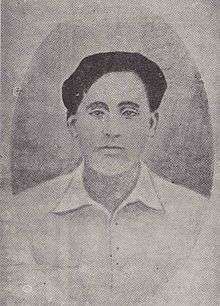Kushal Konwar
| Kushal Konwar (কুশল কোঁৱৰ) | |
|---|---|
 Kushal Konwar | |
| Born |
1905 Sarupathar, Golaghat, Assam |
| Died | 15 June 1943, Jorhat [1] |
| Residence | Gandhkarai Gaon, Sarupathar |
| Nationality | Indian |
| Years active | 1920-1942 |
| Known for | Freedom Fighter |
| Political party | Indian National Congress |
| Criminal charge | Hanged |
Kushal Konwar (Assamese: কুশল কোঁৱৰ) was an Indian Assamese Tai-Ahom freedom fighter from Assam and he happened to be the only martyr in India who was hanged during last phase of the Quit India Movement of 1942-43.
Early life, education and work
Kushal Konwar was born in 21 March 1905 at Balijan near Sarupathar in the present District of Golaghat in Assam. Kushal did his schooling in the Bezbaruah School. In 1921, while still at school he was inspired by Gandhiji’s clarion call for Non-cooperation movement and took active part in it. The young man inspired by Gandhiji’s ideals of Swaraj, Truth and Ahimsa, set up a primary school at Bengmai and served as its honorary teacher. Later, he joined the Balijan Tea Estate as a clerk and worked for a while. But, the spirit of independence and call of Mahatma Gandhi inspired him to dedicate himself wholeheartedly in the Independence Movement. He organised the Congress party and lead the people of Sarupathar area in Satyagraha and non-cooperation movement against the British. He was elected the President of the Sarupathar Congress Committee.
Quit India Movement
In 8 August 1942 the Congress Working Committee in its meeting in Bombay passed the "Quit India" resolution. This resolution demanded complete withdrawal of the British from the India’s soil. Mahatma Gandhi gave the call of "do or die" to the people of India. The British reacted by arresting Mahatma and all the Congress leaders and putting them in jails. Across India, this sparked widespread mass movement in against the British. Cutting across caste, creed, and religion the people came out on to the streets shouting the slogan of "Vande Mataram". In spite of Gandhiji’s appeal for peaceful non-cooperation and dharna, in many regions the movement erupted in violence with people burning offices and damaging government properties, disrupting the road, rail and telecommunication network.
People of Assam too spontaneously joined this historic movement of 1942. Two of the leaders of Assam Pradesh Congress, Gopinath Bordoloi and Siddhinath Sarma were arrested by the British in Dhubri while returning from Bombay attending the Congress Working Committee meeting. Other Congress leaders like Bishnuram Medhi, Bimala Prasad Chaliha, Md. Tayebulla, Omeo Kumar Das, Debeswar Sarma, etc., were arrested from different parts of Assam and thrown into jails. Assam too burned like the rest of India and many people leaving the path of non-violence engaged in violence.
On 10 October 1942, hidden in the thick fog of early morning, some people removed few sleepers of the railway line near Sarupathar in Golaghat district. A Military train passing by derailed and many British and American soldiers lost their lives. The British army immediately cordoned the area and started operation to catch the culprits. Innocent people of the area was rounded up, beaten and harassed. The British police let loose a reign of terror; people were beaten up and arrested.
Accusing Kushal Konwar as the chief conspirator of the train sabotage, the British police arrested him. An ardent follower of Gandhiji and his principle of non-violence, Kushal was ignorant about the sabotage plan and action. He was innocent but the police charged him as the mastermind of the train sabotage. He was brought from Golaghat and was lodged in the Jorhat jail on 5 November 1942.
In the Court of CM Humphrey, Kushal Konwar was declared guilty, though there was not a single proof against him. Kushal was sentenced to death by hanging. He accepted the verdict with dignity. When his wife, Prabhavati visited him in the Jorhat jail, he told her that he is proud that God has selected him to be the only one among the thousands of prisoners to give the supreme sacrifice for the country. Kushal spent his remaining days in the death row cell of Jorhat jail in prayers and reading the Gita.
Martyrdom
At dawn on 15 June 1943 at 4.30 am, Kushal Konwar was hanged in Jorhat Jail. He sacrificed his life knowing as Mahatma said: "He alone can be a true satyagrahi who knows the art of living and dying." Gandhi said.
Family
Kushal konwar married to Prabhawati in his early age.He had two sons Thagen and Lagen.
References
- ↑ Assam General Knowledge. Bright Publications. ISBN 978-81-7199-451-9. Retrieved 21 November 2012.